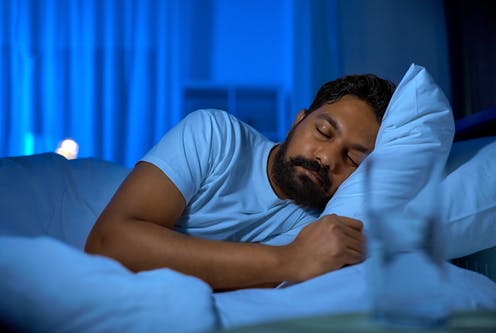
Instead of lying awake worrying, we’re often told to “sleep on it” when making decisions both big and small. And there’s actually a scientific basis for this advice. Sleep can influence our response to emotional situations, and helps us to manage our mental health.
To understand why sleep and emotions are so connected, it’s important to first understand what happens in the brain when we encounter something emotive.
Two main brain regions interact to create emotional responses. The first is the limbic system, which is located deep in our brain. This acts as our emotion centre, quickly evaluating a situation and helping us to decide how to react. Historically, this region may have been important for humanity’s survival, as it helps us react quickly in certain situations – if we encounter a dangerous predator, for example.
But most of the time we need to adjust our initial emotional response. This is where the second region – the prefrontal cortex – comes in. Located just behind our forehead, the prefrontal cortex helps us to increase or decrease our emotional responses as necessary. So if we see a predator (such as a bear) in the zoo, the prefrontal cortex tells us we don’t need to panic because it’s in an enclosure.
These regions need to be well-connected in order to effectively generate and adjust our emotional responses. This is where sleep comes in. When we’re sleep deprived, the connections between these areas weaken, making the reaction in the limbic system stronger. Sleep loss not only increases our reaction to stressful events during the day, it also makes these reactions harder to change. This may be particularly pronounced if you lose REM (rapid eye movement) sleep.
Studies show that getting poor sleep makes us more likely to choose less effective ways of managing our emotions which could have a knock-on effect for our mental health. Imagine you’re experiencing a difficult work problem. If you’re well rested, you are more likely to be able to effectively problem solve, fixing the issue. But if you’re sleep deprived, you might avoid dealing with the problem. Over time, this could have a negative effect on wellbeing.

Alex from the Rock/ Shutterstock
Sleep is also crucial for processing and consolidating memories from our day. When we have emotional experiences, sleep both helps us remember these events and remove the associated feelings. This happens in REM sleep, when activity in most brain regions is similar to when we’re awake. By reactivating memories during REM sleep, the associated feelings can be removed from the content of the memory. This is why “sleeping on it” really can help you feel better in the morning. Indeed, studies have shown that, over time, improving sleep can lead to less anxiety, depression, and stress, and increased life satisfaction.
A good night’s sleep
If you want to keep your emotions and mental health in check, here are the best ways to get a good night’s sleep:
-
Maintain a consistent bedtime and wake time – even on your days off. This helps your body clock get into a routine, improving your sleep. Having a big shift in sleep time between your work and free days is known as “social jetlag”, which can be associated with increased anxiety.
-
Seek out natural light in the morning and avoid blue light in the evening. Our body clock is strongly affected by light. It impacts a part of the brain called the supra-chiasmatic nucleus, which releases a sleep hormone called melatonin. Getting natural light in the morning helps us to suppress melatonin, which improves our mood and makes us feel more alert. The blue light found in electronic devices also minimises melatonin. This means that using electronics in the evening can result in it taking longer for us to feel sleepy. So we recommend that you turn them off or set them to “night time mode” an hour before you go to bed.
-
Avoid certain substances – such as alcohol, caffeine and nicotine. Caffeine and nicotine are stimulants, which can interfere with our body’s drive to sleep. It’s best to avoid these, particularly in the afternoon and evening as our body gets ready for sleep. Alcohol also changes the structure of our sleep, making us more likely to wake up during the night. Studies also show using alcohol daily can decrease sleep quality, especially for people with anxiety.
-
Allow yourself time to wind down before bed. Make sure your bedroom is comfortable, cool, quiet and dark to minimise chances of being disturbed. Before bed, try using relaxation or mindfulness techniques, which have been linked with both better sleep quality and better overall mental health.
Getting a good night’s sleep can work wonders for improving our mental health. But it doesn’t stop there. Sleeping well can also improve our memory, attention and other thought processes. It also benefits several aspects of our physical health, including our weight and heart, making sleep an important priority for all aspects of our wellbeing.
![]()
Joanne Bower does not work for, consult, own shares in or receive funding from any company or organisation that would benefit from this article, and has disclosed no relevant affiliations beyond their academic appointment.























